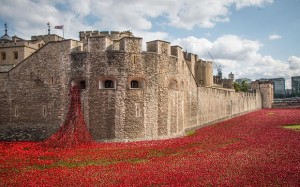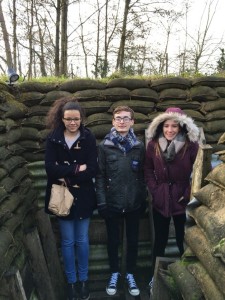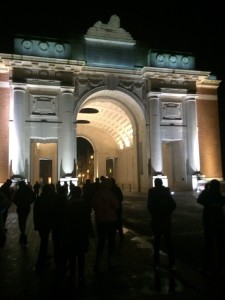WW1 Battlefields Tour
Year 13 –WW1 Battlefield Tours – February 2016 Following on from this the government created a project to allow each school in the country to take several students to the battlefields of the Somme and the Ypres Salient to further understand the scale of the war, its effects on ordinary citizens, the lives of the soldiers taking part and the importance of remembrance. Our own trip took place with three A-Level History students in February of this year. The trip allowed us to visit a variety of battlefields including the Ypres Salient and the Somme as well as visiting a variety of cemeteries such as Tyne Cot, Langemark and Lijssenthoek. Between them these cemeteries hold the names of nearly 50,000 soldiers who perished in the war. By viewing these graves you are able to begin to appreciate the scale of the war, the loss of life and the contribution played by all parts of society. Below you will find the comments of the students and their experiences whilst partaking in this trip. Hannah Gomm This leads us to question whether remembering this sacrifice is important 100 years on. We cannot truly appreciate nor understand what ordinary people lost in the First World War but since they were fighting to secure a future than we now live in, surely it is important now more than ever to remember. Remembrance educates society on our wartime history as well as how this history is shared with many other nations who fought alongside our own soldiers. Losses from every nation involved are spread across the battlefields in Belgium and France, with cemeteries and memorials telling a story of what happened there. Visiting these cemeteries displays why remembrance is important 100 years on, because every soldier buried in them has a story which deserves to be told otherwise what would be the point in sacrificing yourself for your country just to never be remembered for it? I saw that remembrance is particularly important to the people of Ypres who perform the Last Post at the Menin Gate every evening. For their town to be reduced to brick dust and a whole generation lost, the population there knew that remembrance was the best way to thank those who fought, which is something everyone should carry on. Janiece Jackson One thing that I found to be particularly moving was to visit the battlefields and cemeteries where thousands of fallen soldiers of numerous nationalities, religious affiliations and social classes lost their lives and were buried together in one place. It is easy to fall into the trap of only remembering the sacrifice of others once a year on the 11th November, however, remembrance can take place in many ways. In Ypres, it is achieved through the Last Post Ceremony at the Menin Gate which is held every evening. This particular ceremony showed the significance of remembrance through the dedication of others to continue with this tradition. To add to this, finding the grave of a soldier from Dunstable who died on the Western Front emphasised the extent to which the war really affected ordinary people. When we learn about the First World War in classrooms, it is very easy to detach yourself from the reality of what happened and to think of it as a war that happened in the past and hundreds of miles away from yourself. However, researching a local soldier and finding his grave showed how the war affected everyone to one degree or another, with some unfortunately having to make the ultimate sacrifice. It is important to remember the stories of those who lost their lives and to appreciate the sacrifices that were made in order to secure peace for future generations. The trip offered an experience to understand how people’s lives were affected by the Great War and highlighted the importance of remembering those who gave their tomorrows for our todays. Sam Duffy It’s easy to say that the Battle of the Somme was a complete disaster. It was the single largest loss of life for the British Army in history and thousands died for very little territorial gains. However, the offensive did help relieve pressure on the French, who were struggling to hold the fortress of Verdun further north in France. This relieved pressure helped the French to repulse the Germans, who had directed troops south to bolster defences in the Somme. It may have been a disaster for us, but for our allies it was pivotal in showing that we were able to take initiative and not leave the fighting to just the French. Remembrance is by far more important now than it was 100 years ago. Today, there are no survivors of the war left to give us their first-hand accounts of what they experienced. With all the world’s problems, it is important to look back on our past and learn from our mistakes. The soldiers of the First World War gave the ultimate sacrifice to ensure the world remained free. The quote “When you go home, tell them of us and say for their tomorrow, we gave our today” should always be remembered. John McCrae, Canadian Expeditionary Force. In Flanders Fields In Flanders fields the poppies blow We are the Dead. Short days ago Take up our quarrel with the foe: The start of the First World War passed its centenary in 2014 and continues to play a prevalent part in the education of both students and adults alike. A topic that touches almost every home in the UK can encourage memories of pride and passion for those who fought for our country whilst the nature of destruction and scale of loss of life are something that cannot and should not be forgotten. In 2014 the nation as a whole was encouraged to remember the First World War and tributes were created up and down the country including those that were particularly impressive at the Tower of London.
The start of the First World War passed its centenary in 2014 and continues to play a prevalent part in the education of both students and adults alike. A topic that touches almost every home in the UK can encourage memories of pride and passion for those who fought for our country whilst the nature of destruction and scale of loss of life are something that cannot and should not be forgotten. In 2014 the nation as a whole was encouraged to remember the First World War and tributes were created up and down the country including those that were particularly impressive at the Tower of London. Students were able to witness the Last Post Ceremony which takes place at the Menin Gate every single night in the centre of Ypres. This ceremony marks the remembrance of each individual who sacrificed their life from the benefit of others.
Students were able to witness the Last Post Ceremony which takes place at the Menin Gate every single night in the centre of Ypres. This ceremony marks the remembrance of each individual who sacrificed their life from the benefit of others. WW1 affected ordinary people as families, towns and western civilisation were destroyed. This created an anti-war feeling amongst the general public and motivated people to become self-sufficient. Poverty suffered by ordinary people drastically increased during and following WW1, the men, being the main source of income for a family, did not always return from war leaving families to depend on the mother to support them. This increased the number of women in the work place as well as improving their social status. Nevertheless, the hardships of the war rested on the shoulders of the ordinary people, especially the men who volunteered or were conscripted into the army to fight on the frontline. The conditions that these soldiers had to bear during the war period in the trenches were gruesome, uncertain and deadly; witnessing trenches on the frontline brought to light how ordinary people were thrown into a situation that they possibly weren’t going to emerge from. This sacrifice from ordinary people led to the Allies winning the war but resulted in a great loss of life.
WW1 affected ordinary people as families, towns and western civilisation were destroyed. This created an anti-war feeling amongst the general public and motivated people to become self-sufficient. Poverty suffered by ordinary people drastically increased during and following WW1, the men, being the main source of income for a family, did not always return from war leaving families to depend on the mother to support them. This increased the number of women in the work place as well as improving their social status. Nevertheless, the hardships of the war rested on the shoulders of the ordinary people, especially the men who volunteered or were conscripted into the army to fight on the frontline. The conditions that these soldiers had to bear during the war period in the trenches were gruesome, uncertain and deadly; witnessing trenches on the frontline brought to light how ordinary people were thrown into a situation that they possibly weren’t going to emerge from. This sacrifice from ordinary people led to the Allies winning the war but resulted in a great loss of life. The First World War was undoubtedly a conflict which changed people’s lives– from soldiers fighting on the battlefields of France and Belgium, to their families at home, and– although not necessarily always focused on or remembered to the extent of others– ordinary people whose homes, schools, churches and entire towns were raised to the ground as a result of the war. When reading about the First World War in textbooks, it is easy to forget the way in which it affected ordinary people, whose towns and villages had been turned into some of the bloodiest battlefields in history. In Belgium alone between 1914 and 1915, refugees fled (to France and the Netherlands in particular) in search of shelter and protection from the war, with over 16,000 finding refuge in the UK. To make matters even worse, food shortages became commonplace in Europe, with queues of people all waiting outside of shops becoming frequent. Therefore, if you were lucky enough for your town or village to be intact, the likelihood was that you would have experienced food shortages at the very least—this was certainly the case in the UK. This was likely due to two main reasons: firstly, because horses that would be used in farms were requisitioned for the war effort and agricultural workers were taken away from farms. There was also much destruction of farmland (in France and Belgium) by artillery fire. Secondly, France and Britain were heavily reliant on imports of grains in order to feed their populations, however, the German U-boat campaign ultimately took its toll on the availability imported supplies.
The First World War was undoubtedly a conflict which changed people’s lives– from soldiers fighting on the battlefields of France and Belgium, to their families at home, and– although not necessarily always focused on or remembered to the extent of others– ordinary people whose homes, schools, churches and entire towns were raised to the ground as a result of the war. When reading about the First World War in textbooks, it is easy to forget the way in which it affected ordinary people, whose towns and villages had been turned into some of the bloodiest battlefields in history. In Belgium alone between 1914 and 1915, refugees fled (to France and the Netherlands in particular) in search of shelter and protection from the war, with over 16,000 finding refuge in the UK. To make matters even worse, food shortages became commonplace in Europe, with queues of people all waiting outside of shops becoming frequent. Therefore, if you were lucky enough for your town or village to be intact, the likelihood was that you would have experienced food shortages at the very least—this was certainly the case in the UK. This was likely due to two main reasons: firstly, because horses that would be used in farms were requisitioned for the war effort and agricultural workers were taken away from farms. There was also much destruction of farmland (in France and Belgium) by artillery fire. Secondly, France and Britain were heavily reliant on imports of grains in order to feed their populations, however, the German U-boat campaign ultimately took its toll on the availability imported supplies. The impact of the war was seen in corners of life, not just on the soldiers fighting on the battlefield. From the richest of aristocrats to the poorest of factory workers, the war still affected their family. Loved ones were lost, houses and properties destroyed and families displaced all over the world. Life in mainland Europe was no exception. Every community whether a small English village or a large French city was affected, either physically, financially or emotionally.
The impact of the war was seen in corners of life, not just on the soldiers fighting on the battlefield. From the richest of aristocrats to the poorest of factory workers, the war still affected their family. Loved ones were lost, houses and properties destroyed and families displaced all over the world. Life in mainland Europe was no exception. Every community whether a small English village or a large French city was affected, either physically, financially or emotionally.
Between the crosses, row on row,
That mark our place; and in the sky
The larks, still bravely singing, fly
Scarce heard amid the guns below.
We lived, felt dawn, saw sunset glow,
Loved and were loved, and now we lie
In Flanders fields.
To you from failing hands we throw
The torch; be yours to hold it high.
If ye break faith with us who die
We shall not sleep, though poppies grow
In Flanders fields.




